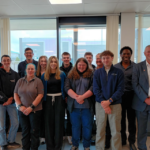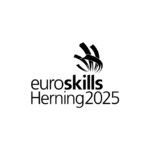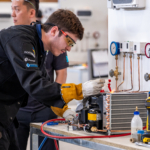We hear from Mandy Crawford-Lee Chief Executive and Associate Editor of Higher Education, Skills and Work-based Learning, the official journal of University Vocational Awards Council (UVAC) about how working with WorldSkills UK is helping build the profile for higher and degree apprenticeships, helping to create a skills economy across the UK.
UVAC represents over 80 higher education institutions in the UK delivering higher technical education including higher and degree apprenticeships. Its purpose is to champion higher level technical education and skills including apprenticeship to the benefit of individual learners and employers. UVAC is a key strategic partner of WorldSkills UK.
UVAC first exhibited at the WorldSkills UK LIVE in 2017 as part of the education zone and then in 2018 and 2019. In that period UVAC worked closely at a strategic level with the WorldSkills UK Corporate Partnerships Team on how to maximise opportunities for attendees (young people, teachers, and careers advisors) to understand more about the opportunities offered by higher and degree apprenticeships.
We used existing national apprenticeship service degree apprenticeship material and prepared summaries of the top 10 higher and top 10-degree apprenticeships and factsheets for both teachers and advisers and separately, apprentices, which would be of most interest to this audience.
Dr Neil Bentley Gockmann OBE, WorldSkills UK’s CEO wrote an article in UVAC’s peer reviewed journal, ‘Higher Education, Skills and Work-based Learning’, for publication in a special issue on higher and degree apprenticeships: Equality and diversity matter, published in 2020. The article was titled ‘Towards greater inclusion in skills competition’.
WorldSkills UK Deputy CEO Ben Blackledge also presented a keynote speech with Middlesex University at our online event in March 2021 where Minister Gillian Keegan also spoke.
We now have a memorandum of understanding (MoU) agreed covering our work together to promote higher technical qualifications through career advocacy and bring universities on board to promote degree apprenticeships to young people. Together we are also facilitating best practice exchanges through international partnerships. UVAC members help deliver the programmes in the WorldSkills UK policy paper Levelling up through skilling up.
As part of our work with WorldSkills UK, UVAC will focus on excellence and challenging prejudice, changing perceptions, and highlighting that skills are not just about craft and trade and individuals already in the workplace are an important aspect of policy and practice.
We will highlight how to utilise people resources properly – capturing stories to use with, for example, the Baker Clause, which stipulates that schools must allow colleges and training providers access to every student in years 8- 13 to discuss non-academic routes that are available to them. Plus:
- further development of an ‘Inspire’ higher technical education strand with key messaging on skills importance to professional occupations and routes into the professions in the public sector (nursing, policing, social worker, allied health roles) and the private sector (digital, IT, engineering, construction, and the built environment, leadership, and management)
- analysis of Green Skills including higher level technical education and skills, and degree apprenticeships
- demonstrating impact of higher-level technical education and skills, including higher and degree apprenticeships, on social mobility, levelling-up, productivity via use of appropriate metrics and measures linked to HEIs’ access and participation plans
- direct involvement and support of WSUK equality, diversity, and inclusion policies.
The Government wants to expand the number of higher and degree apprenticeships delivered and increase the amount of higher technical education provision through the introduction of higher technical qualifications (HTQs). The Government and the Institute for Apprenticeships and Technical Education (IfATE) also want to support the development of a new degree apprenticeship brand. UVAC has produced a growth plan for higher technical education, lifelong learning, and higher and degree apprenticeships.

Higher and degree apprenticeship and higher technical education will have a key role to play in supporting individuals from disadvantaged backgrounds and under-represented cohorts to access and progress through higher education and secure employment in professional and higher technical roles. Despite this, it must be understood that the programmes are available for individuals from all backgrounds. If higher and degree apprenticeship and higher technical education are primarily seen as programmes for the disadvantaged this will undermine their contribution to raising productivity, recruiting, and training individuals for key public sector service roles, enhancing workforce diversity and the Green Jobs and Net Zero agenda.
UVAC aligns so well with WSUK’s endeavours to engage providers of all types and sizes in recognising the value of competitions to motivate learning and to create opportunities to progress in a chosen occupation or progression for young adults; indeed, to develop new recruitment pathways and recruit new cohorts. This is why we have decided to sponsor the Competitor Support Fund.
The value of competitions for higher and degree apprenticeships is in linking universities with skills policy and skills solutions and reminds the skills system that technical or applied provision is not just about traditional further education programmes.
Skills competitions need to evolve, for example, in the public sector, where degree apprenticeship account for a growing proportion of all starts and a significantly higher proportion of employer spend on apprenticeship, the fastest growing areas of provision are predicted to be nursing and healthcare occupations, police constables and social workers.
In the private sector, chartered surveyors, engineers, and digital specialists will be key occupations where degree apprenticeship is used. Few would disagree with the argument that to become a nurse an individual needs to combine academic study with practice. This is what a nursing apprenticeship does. Similarly, through an apprenticeship an engineer needs to apply academic study to practice achieving professional competence, as required by a professional body. All of these can be occupational areas for the development of new competitions.

Instead of seeing apprenticeship as a programme primarily for young people to enter lower-level jobs we argue that apprenticeship should be an aspirational all age programme that supports individuals from all backgrounds gain the high productivity craft, technical and professional jobs the economy needs. Crucially, this means substantially more must be done to support individuals from more disadvantaged backgrounds access higher and degree apprenticeships.
Among other measures, UVAC proposes ensuring apprenticeships at all levels form part of a skills ladder and that apprentices unambiguously gain the knowledge and skills required to progress to higher land degree apprenticeships. UVAC is working with its member universities to produce evidence of how higher and degree apprenticeships support social mobility and create opportunities through work into professional careers.
Together UVAC and WorldSkills UK will empower young people to explore higher technical education and degree apprenticeship pathways through joint thought leadership pieces of writing and in our advocacy/representation work with government and stakeholders and different providers of higher technical education and higher and degree pathways, including showcasing where skills competitions result in good quality outcomes.
As the UK emerges from the Covid 19 pandemic there is a unique opportunity to define how higher and degree apprenticeships and higher technical qualifications can be used to support a post-pandemic economic recovery and support the delivery of public sector services. Higher and degree apprenticeships and higher technical qualifications should also be central to the implementation of the Government’s Levelling-Up agenda.
There are a number of actions which needed to be taken by government and agencies:
- agree the rationale and objectives for the expansion of higher and degree apprenticeship and higher technical education
- determine how national and local targets informed by forecast future skill needs and skills gaps and shortages can be agreed. Any targets for higher and degree apprenticeship and higher technical education must be based on the objectives of these programmes and rooted in defined skills needs
- establish a working group to agree action to remove current barriers to the expansion of higher and degree apprenticeship and higher technical education and guide action to support growth. Any growth plan should be led by the IfATE, working with employers, professional statutory and regulatory bodies (PSRBs) and higher education providers
- agree appropriate targets and measures including a national target to expand higher and degree apprenticeship could be useful to convey the value and importance the Government attaches to such programmes. A national target could also be determined for higher technical qualifications. Targets for specific occupations if seen as appropriate by relevant PSRBs and employers could be of value. Requiring institutions to set targets could, however, prove counterproductive. Institutions have very different missions and focus.
- enable and support local Enterprise Partnerships (LEPs) and Metro Mayors to consider local and regional approaches to higher and degree apprenticeships and higher technical education. Higher and degree apprenticeship and higher technical qualifications could play a key role in the Levelling Up agenda. It could be useful to suggest that LEPs and Metro Mayors should consider the value of higher and degree apprenticeships and higher technical qualifications in local approaches to skills provision.
- raise employer awareness of the benefits and value of higher and degree apprenticeships and higher technical education via IfATE, working with employers and HEIs/UVAC, awarding organisations, FE colleges and independent training providers (ITPs) could publish case studies of how higher and degree apprenticeship and higher technical qualifications have supported organisations to train and develop new and existing employees and raise business performance
- turbocharge specific apprenticeship standards and key higher technical qualification subject areas eg: Nursing, Policing, and STEM sectors. In working with employers, PSRBs and HEIs UVAC has already established Degree Apprenticeship Knowledge Networks (DAKNs) for several key degree apprenticeships. DAKNs aim to share good practice in delivery and identify opportunities and issues in the delivery of key degree apprenticeships. The IfATE working with the Education and Skills Funding Agency (ESFA), UVAC and others could facilitate the development of new communities of practice, such as DAKNs, to develop provision in key areas
- raise awareness among young people, schools, and parents. Undoubtedly more work needs to be conducted with schools and colleges to raise awareness levels and understanding of higher and degree apprenticeships and higher technical education among young people and their parents. This, however, needs to be done with care. Firstly, higher and degree apprenticeships and higher technical education must be presented as an aspirational offering. Secondly, places for and the recruitment of higher and degree apprentices will depend on employers. An apprenticeship is first and foremost a job and their availability will be based on employers’ need to recruit and train individuals for specific occupations
- raise awareness among older individuals and employees. As well as working with schools, work is needed to outline how higher and degree apprenticeship and higher technical qualifications can be used by older learners and those in the workforce
- use of occupational maps to demonstrate how higher and degree apprenticeships and higher technical education can lead to higher technical and professional level occupations. The occupational maps being developed by the IfATE need to be promoted. They should, however, do more than ‘show where technical education can lead’, but instead demonstrate progression routes to and through technical and higher technical education to professional level occupations and include a specific focus on professional membership and licence to practice
- Supporting providers to deliver higher and degree apprenticeships and higher technical Education. The ESFA-funded Apprenticeship Workforce Development Programme should provide specific support to providers of higher and degree apprenticeship. The Department for Employment (DfE) and ESFA may also wish to consider how this programme relates to the delivery of higher technical qualifications
- evaluation and monitoring: IfATE needs to monitor and evaluate the take-up of higher and degree apprenticeships and higher technical qualifications on an annual basis and consider how both programmes are delivering in terms of their objectives.





